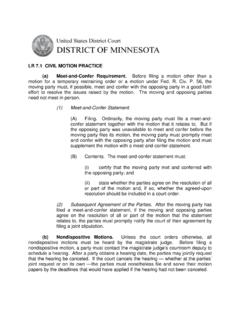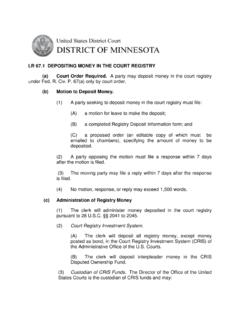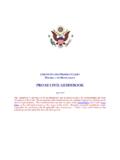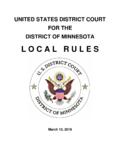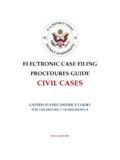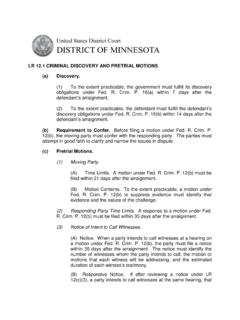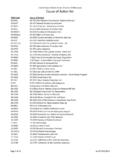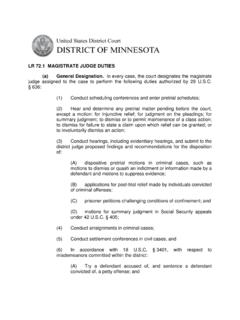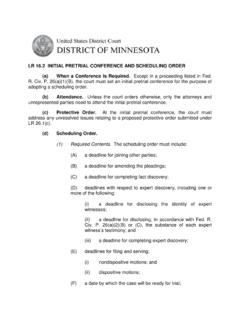Transcription of (a) Conference Content. At the Rule 26(f (b) Rule 26(f ...
1 (a) Conference content . at the rule 26(f) Conference , the parties must discuss: (1) the matters specified in Fed. R. Civ. P. 26(f); (2) the matters specified in the notice of the initial pretrial Conference and in any applicable order; and (3) the matters specified in the Rule 26(f) Report and Proposed Scheduling Order Form. (b) Rule 26(f) Report and Proposed Scheduling Order. (1) Timing. Within 14 days of the Rule 26(f) Conference , the parties must file a joint Rule 26(f) report and proposed scheduling order. (2) Form. Unless the court orders otherwise, the parties must use the Rule 26(f) Report and Proposed Scheduling Order Form. (3) Disagreements. If the parties disagree about an aspect of a proposed scheduling order, each party must set forth its separate proposal with respect to the area of disagreement in the joint Rule 26(f) report and proposed scheduling order. (c) Protective Order. (1) Proposed Order.
2 If a party believes that a protective order to govern discovery is necessary, the parties must jointly submit a proposed protective order as part of the joint Rule 26(f) report and proposed scheduling order required under LR (b). (2) Form. The court encourages, but does not require, the parties to use the Stipulation for Protective Order Form. (3) Disagreements. If the parties disagree about an aspect of a proposed protective order, the parties must submit a joint report identifying their areas of disagreement. This joint report may be but is not required to be separate from the parties joint Rule 26(f) report. (d) Request for Early Rule 26(f) Conference . (1) Right to Request a Conference . Any party may request a Rule 26(f) Conference before the date on which Rule 26(f) requires the Conference to be held. (2) Mandatory Attendance. (A) If all parties have been served, the non-requesting parties must attend a Conference requested under LR (d)(1) if: (i) the request is made in writing at least 14 days before the requested date for the Conference ; and (ii) the request is made at least 30 days after each defendant has answered, pleaded, or otherwise responded in the action.
3 (B) If some parties have not been served, the non-requesting parties who have been served must attend a Conference requested under LR 26(d)(1) if: (i) the request is made in writing at least 14 days before the requested date for the Conference ; (ii) the request is made at least 30 days after the parties that have been served have answered, pleaded, or otherwise responded in the action; and (iii) significant delay is expected to occur before the remaining parties will be served. (3) Failure to Attend. If a party fails to attend a Conference requested under LR 26(d)(1), the court may impose appropriate sanctions under Fed. R. Civ. P. 37(f). (4) Right to Reschedule. A party may make a reasonable request to reschedule a Conference requested under LR 26(d)(1) to a date within 14 days of the date initially requested for the Conference . A party that makes such a request to reschedule is not required to attend the Conference on the date initially requested.
4 [Adopted effective November 1, 1996; amended January 3, 2000; amended August 31, 2001; amended December 1, 2009; amended July 23, 2012; amended April 1, 2017] 2017 Advisory Committee s Note to LR In 2017, the Court removed all forms from its local rules . The Rule 26(f) Report and Proposed Scheduling Order Form and the Stipulation for Protective Order Form may be found on the Court s website. 2012 Advisory Committee s Note to LR The language of LR has been amended in accordance with the restyling process described in the 2012 Advisory Committee s Preface on Stylistic Amendments. New LR (a)-(b) clarifies the parties obligations to meet and confer and file a report under Fed. R. Civ. P. 26(f) in the form prescribed in LR Form 3 (non-patent cases) or LR Form 4 (patent cases), unless the court orders otherwise. New LR (a)-(b) includes matter previously found in LR relating to Fed.
5 R. Civ. P. 26(f). Forms 3 and 4 were revised as described in the 2012 Advisory Committee s Preface on LR Forms 3-6. Local Rule (c) is new. Subsection (c) was added to require the parties to address whether a protective order is necessary and incorporates reference to LR Form 5 and Form 6. Forms 5-6 are presented as templates for protective orders; the court may on its own or on motion depart from the templates. The language in LR (d) was previously found in former LR (f). 2001 Advisory Committee s Note to LR (1) The 1993 Amendments to the Federal rules of Civil Procedure permitted district courts to exempt classes of cases from the initial disclosure rules . The 2000 Amendments to the Federal rules of Civil Procedure remove the authorization for local-rule exemption. The Committee Notes to the 2000 Federal rules of Civil Procedure Amendments state that the purpose of the amendments are to establish a nationally uniform practice for initial disclosures and to restore national uniformity to disclosure practice.
6 Accordingly, the local rule exemptions to initial disclosures are removed. (2) The 1993 Amendments to the Federal rules of Civil Procedure stated, By order or by local rule, the court may alter the limits in these rules on the number of depositions and interrogatories and may also limit the length of depositions under Rule 30 and the number of requests under Rule 36. The 1996 Local rules Amendments interpreted that language to permit limitations on discovery for certain categories of cases. The 2000 Federal rules of Civil Procedure Amendments remove the authorization for local-rule limitations on discovery (except for limitations on Rule 36 Admissions). The Local rules Advisory Committee interprets this amendment as removing the authorization for the categorical limitations on discovery by local rule. In addition, the 2000 Amendments appear to remove the authority to exempt certain cases by local rule ( , class actions) from the Federal rules of Civil Procedure limits on interrogatories and depositions.
7 (3) Given the deletion of the remainder of (b), the Advisory Committee determined that there was no need for this cross-reference. (4) The 1996 Local rules permitted discovery in certain classes of cases to begin before the 26(f) meeting. This rule was authorized by 26(d) which provided, Except when authorized under these rules or by local rule, order, or agreement of the parties, a party may not seek discovery from any source before the parties have met and conferred as required by subdivision (f). The 2000 Amendments to the Federal rules of Civil Procedure remove the authority for local-rule modification of the general rule that discovery must be delayed until after the 26(f) meeting. (5) The 2000 Amendments to the Federal rules of Civil Procedure removed the authority for local rule exemptions from the 26(f) meeting requirement. Thus, those exemptions have been removed from the local rule.
8 The 2000 Federal rules of Civil Procedure Amendments lengthened the lead-time between 26(f) meeting and pretrial Conference from 14 to 21 days. This change is reflected in the local rule. Nothing in the 2000 Amendments limits the district court s authority to clarify the means of scheduling a 26(f) Conference or specify the content of the report to the court. Accordingly, these provisions of the local rule are unchanged.
